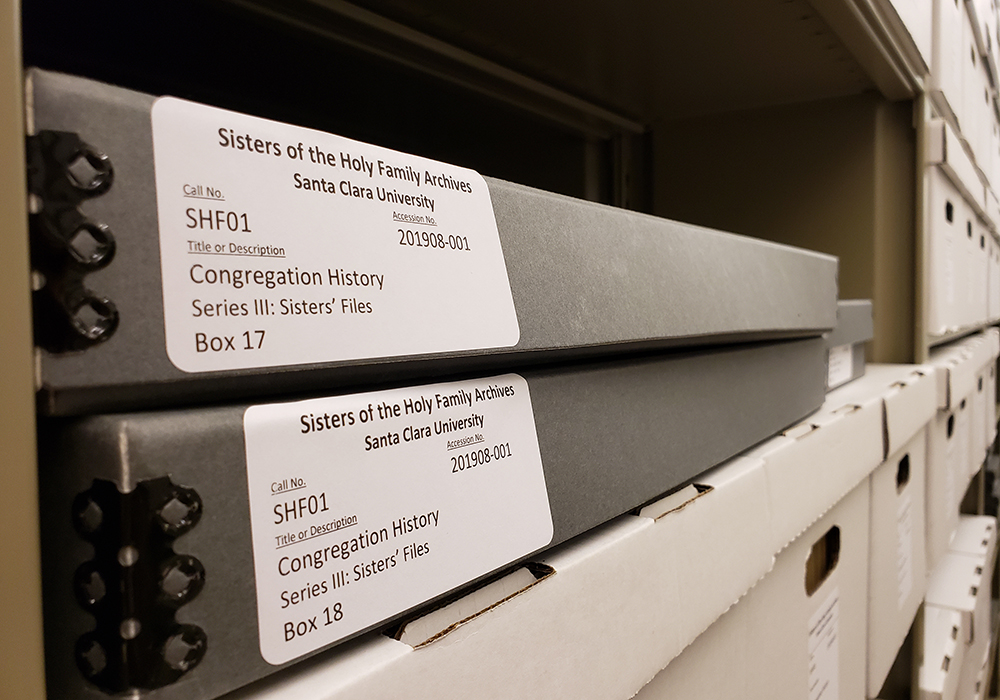The need is both large and pressing: Nearly four in 10 congregations of women religious surveyed in the United States are in the process or have plans to merge or close in the next decade, but only about one in three have long-term plans for their archives.
A study by the Center for Applied Research in the Apostolate at Georgetown University, released in the spring, laid bare what archivists and congregational leaders already suspected.
“Congregations are getting smaller and some are coming to completion,” said Sr. Ginger Downey. “Even if they’re not nearing completion, they don’t have the members who can run these archives. A lot of congregations are not in federations — they don’t have anyone to turn to.”
Downey, of the Our Lady of Victory Missionary Sisters, known as the Victory Nolls, is part of a nationwide effort to create resources for preserving these archives. A consortium of four sites is working to collect and preserve religious archives and eventually be linked together to provide access to the holdings of all four facilities.
The four partners are also working with the Archivists for Congregations of Women Religious, Archival Resources for Catholic Collections, the Council of Major Superiors of Women Religious, the Leadership Conference of Women Religious, and the Resource Center for Religious Institutes.
At risk is the rich heritage and history of Catholic sisters, who have been ministering in what would become the United States since 1727 and in what would become Canada nearly 100 years before that.
A quote is displayed in a graphic, from one of the participants in a focus group held as part of a study by the Center for Applied Research in the Apostolate at Georgetown University, released in spring 2023
(GSR graphic)
“I think it’s American history, and it’s church history, and women’s history,” said one participant in a focus group for the CARA study. “Women’s history has been kind of invisible and suppressed. This is an extraordinary contribution to women’s history in this country.”
CARA sent surveys in 2022 to the superiors of all 522 congregations of women religious in the United States; 210 responded. Only 32% of respondents have a long-term plan to preserve and manage their archival collections. Twenty-nine percent said they’re worried about how to pay for future management of their archives.
“We need funding to save these collections, create these spaces, and create a robust system for the future,” said Sr. Susan Durkin. Durkin, an Ursuline Sister of Cleveland, is project manager for the Women Religious Archive Collaborative in Cleveland; Downey is part of the Heritage and Research Center at St. Mary’s College in Notre Dame, Indiana. The other members of the consortium are Boston College and Santa Clara University.
“The general public does not realize we have these rich resources and the value of them,” Durkin said. The archives are “a way to tell our story — it’s a way to tell America’s story, because America’s story can’t be told without our piece of this.”
Michael Burns is the associate director of the Catholic Religious Archives Repository at Boston College, which has made a major commitment to preserving archives of both women and men religious. It has already spent about $1 million to renovate an entire floor of one of its libraries to bring it to archival standards and is now planning a new building to house religious archives. Plans are not complete, but Burns expects the new building to cost more than $65 million; construction is set to start June 1 and when complete, it will be able to house 100,000 linear feet of records.
“That’s a lot of linear footage,” Burns said. “On the other hand, God only knows how many linear feet of records we’ll have.” He recently spoke to officials from one congregation that has 7,000 linear feet of records. Boston College currently houses about 6,000 linear feet.
Boston has about 10 collections, has signed agreements with about 18 more congregations, and is close to signing agreements with six to eight more, Burns said, who added that he is in discussion with another 10 orders.
“The work those people did, that’s all very important American history,” he said. “Yes, it’s going to cost Boston College a lot of money, but it’s absolutely imperative.”
Nadia Nasr, the head of archives and special collections at Santa Clara University Library, said she has been working on the issue for about eight years; in 2018, Santa Clara received the archives of the Sisters of the Holy Family of nearby Fremont, California.
“That collaboration [with the Sisters of the Holy Family] gave us a proof of concept,” Nasr said. “It was a good model for us to develop and that’s informed our conversations with other congregations.”
Santa Clara currently has commitments with five congregations.
Nasr said the Holy Family archives were organized and complete, but that is not always the case.
“I’ve definitely heard stories from others, where it’s someone showing up at the front door with a bunch of boxes,” she said. Both Durkin and Downey said they have found congregational archives that have no computerization.
“Sometimes you get an archivist sister who says, ‘I don’t know anything about archives but the superior told me to be the archivist,’ ” Burns said.
Durkin said officials are creating archival response teams — trained archivists that can assess a congregation’s records and at least create a sort of index to what records are there and to give the congregation a work plan on what to do to prepare for the future.
“If you’re a congregation, you need to know what you’re giving away,” Durkin said. “You can’t just pack it all up and send it to Boston or Santa Clara without legal agreements — it’s part of the congregation’s patrimony.”
Durkin said one congregation’s archives are now on nine pallets that have been in storage for a year because they had sold the motherhouse and had to move out within 90 days, but hadn’t made a plan for what to do with their records. Downey said another congregation’s archives have been in a rented storage unit for a year because they couldn’t find anyplace ready to take it.
Downey said some congregations assume that because they started a college or university, that is the best place for their archives to go after completion, but that might not be true.
“Some small liberal arts colleges are not doing great,” Downey said. “They may not even be able to handle it,” let alone be responsible for the archives in perpetuity.
There are also legal issues such as privacy requirements for personnel and certain educational records, canonical issues over ownership of records and objects, and, of course, how to pay for it all.
“Particularly women religious, they don’t have the resources for this,” Burns said. “The nuns don’t have the money to do it.”
And there is no model to follow for creating a national network of archives from dozens or even hundreds of congregations.
“Sometimes I feel like we’re building the car as we’re driving it,” Durkin said.
There are other collaborative archive efforts, but they tend to be within charism families. For example, the Franciscan Central Archive is open to Franciscan communities and organizations. Begun in 2018, officials are now assessing needs and preparing collections; plans call for a shared library and reading room within the Chicago Collaborative Archive Center, which is scheduled to open in downtown Chicago within the next 10 years.*
Burns said the most important thing right now is preservation of the records; issues such as digitization and access can be figured out later.
Downey said that’s an issue even for congregations everywhere.
“The archive at Victory Noll is two rooms in a basement,” Downey said. “It’s temperature controlled — sort of. Lots of places are just a room.”
Nasr said she understands that congregational leaders facing issues such as how to provide health care for members and selling convents or campuses cannot make preserving their archives their first priority. But keeping and protecting those records is still important.
At Santa Clara University, the Sisters of the Holy Family created one endowment for the long-term care of their archives and another for the university’s ongoing efforts to preserve archives of other congregations.
“If us covering those expenses is one less thing for the leadership to take care of, that’s great,” Nasr said. “It’s super exciting to see this finally coming to fruition.”
Click here to view the National Catholic Reporter article


